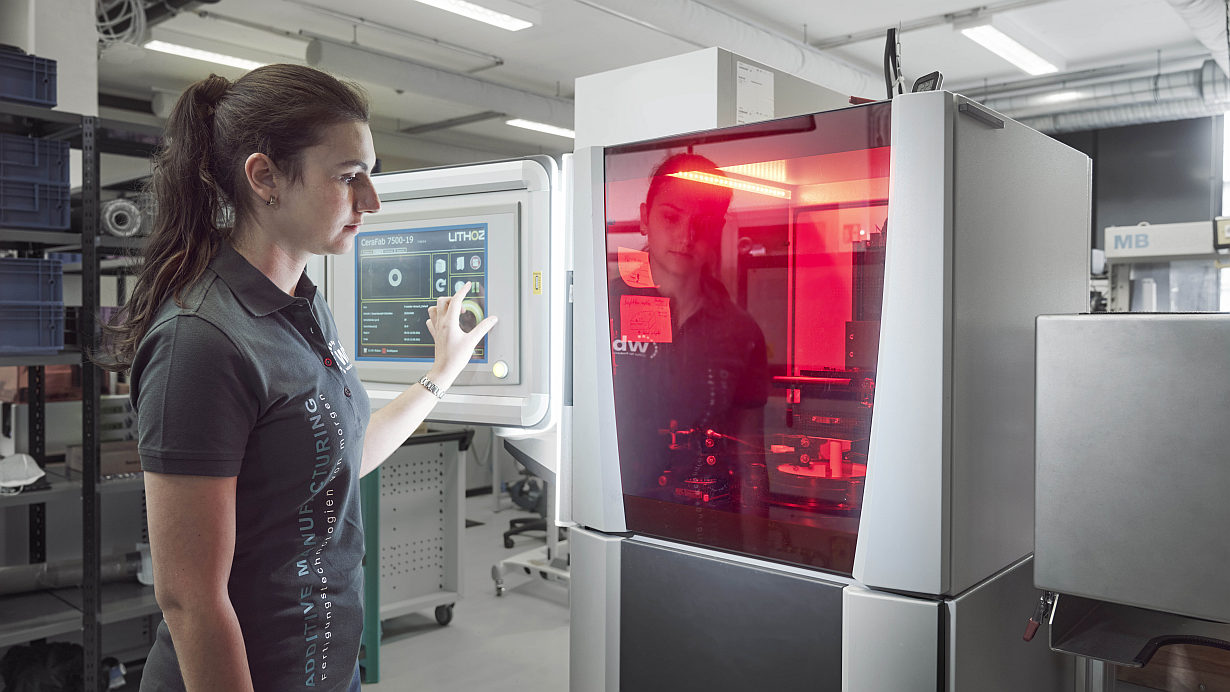The corona pandemic is making it more difficult for a lot of graduates to break into the job market. Aspiring engineers are getting the support they need in the corona graduate program at the “Mobility of the Future” InnovationCampus run by the University of Stuttgart and the Karlsruhe Institute of Technology (KIT). This gives up to 80 recent graduates from both universities the chance of employment at the universities on a temporary basis to work on projects and gain further qualifications. The focus is on getting people involved in a way which is hassle-free and providing individual support. Around 20 graduates have taken part in the program so far. Baden-Württemberg's Minister for Science, Research and the Arts Theresia Bauer spoke to them about their initial experiences at a virtual meeting held on July 20, 2021.
“Helping graduates from our universities find employment, which has become difficult due to the current pandemic, is a key concern, both for myself and the for the Ministry of Science. With the InnovationCampus’ Graduate Program ‘Mobility of the Future’, we aim to create an attractive environment where prospective engineers can participate in innovative research and cooperative projects with companies and gain valuable experience. This is a great opportunity to bridge the gap between graduation and entry into working life,” says Minister of Science, Theresia Bauer.
“Recent graduates who are the most affected by the pandemic need quick and uncomplicated support. With the bridge between study and work being offered by the university, we can make sure that graduates retain the skills they have gained in their university studies and can build on them further. The ‘Mobility of the Future’ InnovationCampus is the ideal way of achieving this”, says the Vice Rector for Knowledge and Technology Transfer at the University of Stuttgart, Professor Peter Middendorf.
“The program gives participants the ideal support they need at this difficult time to start their career. They can gain practical scientific experience through working on research projects and cooperating with companies. They also get the chance to contribute towards new and innovative projects in the enormously important topic of future mobility”, says the Vice President for Innovation and International Affairs at the Karlsruhe Institute of Technology (KIT), Prof. Thomas Hirth.
The ICM’s corona graduate program
The aim of the corona graduate program is firstly to provide further training and qualifications to the participants to improve their chances both during and after the corona pandemic. Graduates improve their subject knowledge as well as their soft skills for job applications and presentations or managing projects by means of an individual qualification program, which the ICM’s management team prepares for graduates together with the relevant institution at the respective university. At the same time, the program also aims to address the shortage of skilled labor by using the corona crisis as an opportunity to provide mobility related training and the associated production, which will be a key topic for the future. The graduates also get the chance to make relevant contacts through industry-oriented projects. If the graduates are offered a job, this takes priority over their employment in the program.
Authorizations and paperwork can be processed quickly to ensure no time is wasted in providing support to the graduates. The first employment contracts were signed no more than a month after publishing the program. There are currently around 60 places in the ICM graduate program still available. The program is also open to graduates from overseas who completed their last university degree in Baden-Württemberg. Further information can be found on the program tender registration website.
The “Mobility of the Future” innovation campus
The purpose of the ICM is to produce new and pioneering technology. Launched in July 2019 and supported with roughly EUR 65 million in funding from the state of Baden-Württemberg, the ICM focuses on emission-free drive systems, digitally-supported production and manufacturing technologies as well as the networking of mobility. At the same time, the ICM wants to attract and support excellent young researchers and start-ups from the field of science.
Further information can be found on the ICM website.
About the University of Stuttgart
The University of Stuttgart, founded in 1829, has around 26,000 students. Its vision of “Intelligent systems for a sustainable society” and its distinctive “Stuttgarter Weg" (Stuttgart Way) stand for consistent interdisciplinary networking of complimentary specialist disciplines as well as integrating engineering, science, humanities and social studies. Its preeminent position as a globally networked research university is reflected, among other things, by the two Clusters of Excellence “Data-Integrated Simulation Science” and “Integrative Computational Design and Construction for Architecture”, the research campus ARENA2036, its participation in the “Cyber Valley” network as well as in numerous collaborative research centers and research training groups.
In close partnership with society, KIT develops solutions for urgent challenges – from climate change, energy transition and sustainable use of natural resources to artificial intelligence, sovereignty and an aging population. As The University in the Helmholtz Association, KIT unites scientific excellence from insight to application-driven research under one roof – and is thus in a unique position to drive this transformation. As a University of Excellence, KIT offers its more than 10,000 employees and 22,800 students outstanding opportunities to shape a sustainable and resilient future. KIT – Science for Impact.

